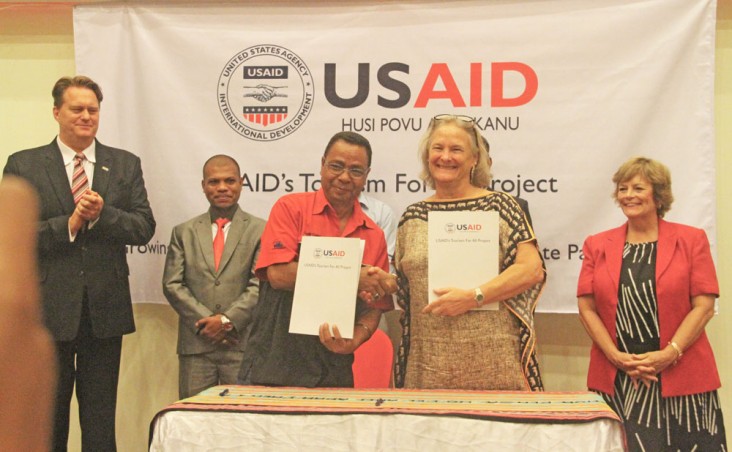Press Release Shim
Speeches Shim

For Immediate Release
DILI, Timor-Leste – Three organizations signed partnership agreements with the United States Agency for International Development’s (USAID) Tourism For All project Wednesday at a forum co-hosted by the U.S. Embassy and the Timor-Leste Secretary of State for Vocational Training and Employment.
The half-day forum ‑‑ “Growing Timor-Leste Tourism Through Public-Private Partnership” -- launched the tourism project’s partnership initiatives in support of the National Tourism Policy of Timor-Leste. The event included a panel discussion on public-private partnerships (PPP) in tourism and a signing ceremony for the first PPP agreements, with Timor-Leste Chamber of Commerce, Federação Cooperativa de Credito Hanai Malu and Kaebauk Investimentu no Finansas.
U.S. Ambassador to Timor-Leste Kathleen M. Fitzpatrick pledged the U.S. government’s commitment to helping Timor-Leste improve tourism-based economic opportunities and diversification. She emphasized the importance of tourism related PPPs to Timor-Leste’s social and economic development. “The U.S. commitment is reflected in USAID’s tourism project objectives to advance the government of Timor-Leste goals of boosting tourist arrivals to 200,000 annually by 2030, increasing tourism employment to 15,000 jobs and generating $150 million in annual tourism revenue,” she said.
Ambassador Fitzpatrick noted that the goals of the project fit well with the U.S. Indo-Pacific Strategy, which emphasizes U.S. support for market-driven economies and sustainable development. She explained that achieving the goals would put Timor-Leste further along the path to self-reliance – a key aim of U.S. foreign assistance.
Timor-Leste Secretary of State for Vocational Training and Employment Julião da Silva acknowledged the importance of ensuring effective, efficient and sustainable growth in tourism as one of the country’s five priority sectors for growth and economic diversification. He thanked the United States for the support and noted that both countries recognized the importance of tourism partnerships in diversifying the country’s economy to benefit local communities and generate employment.
Panelists discussed the Government of Timor-Leste’s experiences in managing PPP and shared experiences of tourism-related PPPs in the ASEAN region. The forum guided participants on the legalities, institutional mapping, key recommendations, and next steps for design and implementation of tourism-related PPPs.
The forum attracted more than 100 participants. Attendees included senior government officials, embassies, private sector, development partners and representatives from civil society organizations who believe ‘partnership’ between public institutions and private sector actors is a critical factor in developing Timor-Leste’s tourism sector.
About USAID: USAID works in partnership with the government of Timor-Leste to support broad-based and effective development. Since 2001, USAID has provided over $308 million in development assistance to Timor-Leste. USAID supports Timor-Leste in its efforts to build a more prosperous, healthy, and democratic country through programs that foster inclusive and sustainable economic growth, especially in the agriculture sector; improve the health of the Timorese people, particularly women and children; and strengthen the foundations of good governance—all areas which are highlighted in Timor-Leste’s Strategic Development Plan 2011-2030. To learn more, visit: www.usaid.gov/timor-leste.
About Tourism For All: USAID’s Tourism For All Project is a three-year project aimed at promoting Timor-Leste’s competitiveness as an international tourism destination while preserving its unique environmental and cultural heritage.

Comment
Make a general inquiry or suggest an improvement.